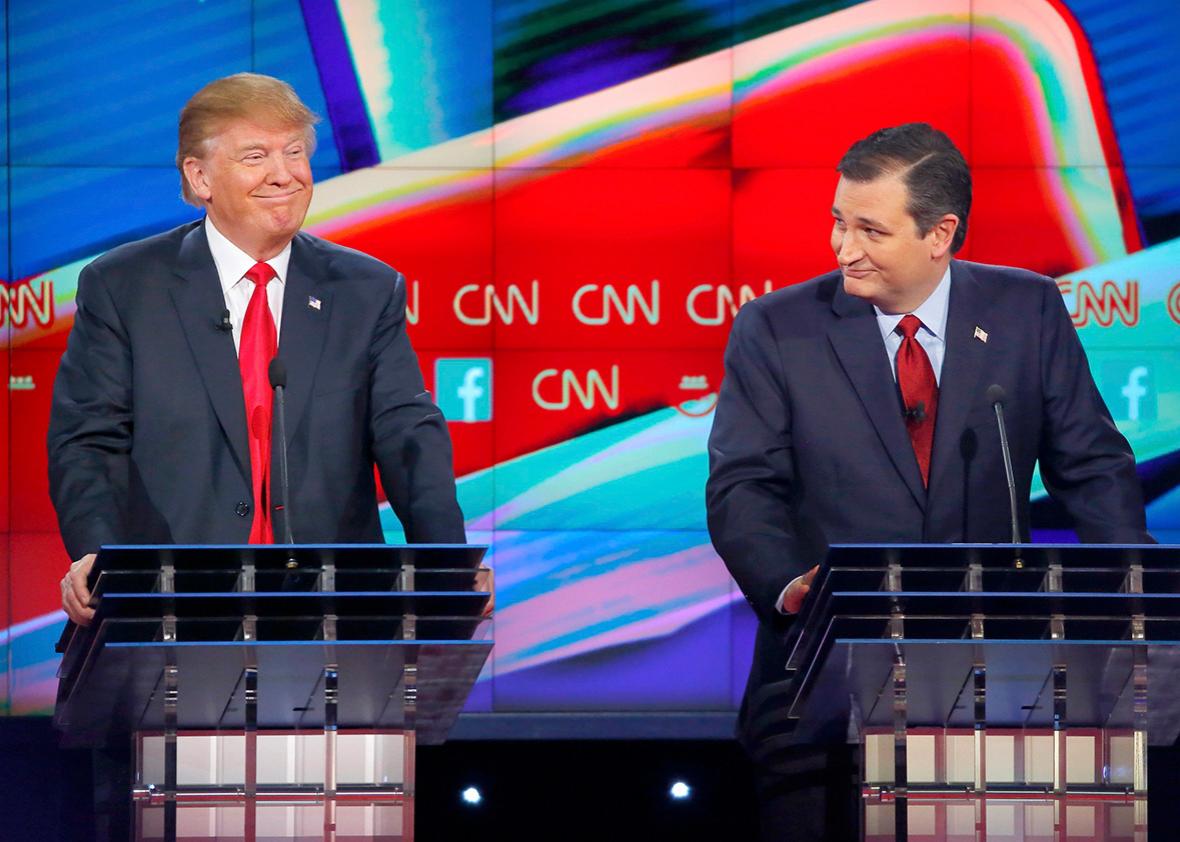Donald Trump won the last GOP debate of 2015 because he was more Trump than ever—and that’s working well for him. In previous debates, the GOP front-runner has seemed to fade during policy discussions. Or his blunt one-size-fits-all answers have seemed insufficient by comparison. As voters scrutinize candidates closer to election time, this could be a liability for Trump. But in the CNN foreign policy debate, most of the GOP candidates were competing to show strength and toughness, which meant the debate took place on Trump’s turf.
When the candidates weren’t committing themselves to feats of strength, they were talking about the cascading dangers America faces, fomenting a sense of fear in the hopes that it will create a greater appetite for the muscles they’re flexing. That’s just another kind of strength competition, which again helps Trump.
It’s not that Trump had a flawless night. By traditional measures of politics, he had plenty of moments that should hurt him. He repeated discredited claims—saying the families of the 9/11 attackers fled the country before the attacks. He doubled down on promises to ban Muslims that have been denounced by Republicans as giving comfort and assistance to ISIS. He was also logically inconsistent: on the one hand saying that he would bomb the bleep out of ISIS and kill terrorists’ families, but then criticizing George W. Bush for indiscriminate killing in Iraq.
So far these kinds of issues haven’t hurt Trump. It would be a safe bet that they won’t hurt him after Tuesday night either.
When Trump did modify his behavior—choosing not to attack Sen. Ted Cruz—it was probably the right thing to do. He’s been catching hell from conservative talk show hosts for criticizing Cruz. That’s the group Trump wants to court, and their audiences are his base, too. Trump may want to bomb ISIS and kill terrorists’ families, but he’s not going to be indiscriminate in his attacks on the Texas senator for fear of offending some of his voters. (Trump also promised not to leave the GOP, which will help him with conservatives because he’s not flirting with doing something that would help Hillary Clinton.)
Trump also benefited because other candidates stayed away from him. Jeb Bush’s and Sen. Rand Paul’s attacks weren’t particularly effective in ways that would strip Trump of votes. Candidates talked a lot about “political correctness,” which makes them sound like Trump clones, even if they were talking about that scourge before he was.
On a recent trip to Iowa, I spent a lot of time talking to Republicans who were looking for some alternative to Trump and Cruz. They were looking to the CNN debate in Las Vegas for some kind of signal that a mainstream candidate might emerge. No one emerged. Worse, for these establishment Republicans, too many of the candidates they’d like to write off did well enough to keep the vote split.
Gov. Chris Christie had perhaps the best night of the mainstream candidates with his relentless focus on national security strength. It was over the top at times—he mentioned his experience as a prosecutor so often it’s possible that viewers may forget he’s a sitting governor. But that’s the competition in the Republican race right now, and Christie was focused on making his pitch to voters. He wasn’t interested in having a debate, and when he did engage with others, it was only in order to repeat his central pitch.
Christie is still a tough sell with some Republicans though, which is why Republicans not sold on Trump or Cruz were really hoping that Sen. Marco Rubio would have a good night. He didn’t. It was Rubio’s worst debate performance. That’s in part because his first two performances were so good. Rubio was also the punching bag for all the other candidates because the work he did on comprehensive immigration reform was something they could denounce to make themselves look tough. The Florida senator had some moments, but not enough to break out.
Cruz and Rubio had a very heated exchange that looked like it could be a preview of coming attractions. Rubio hit Cruz for supporting a reduction in U.S. surveillance capability. “I promise you, the next time there is an attack on this country, the first thing people are going to want to know is: Why didn’t we know about it, and why didn’t we stop it?” Rubio said. “And the answer better not be because we didn’t have access to records or information that would have allowed us to identify these killers before they attacked.” Cruz went after Rubio for helping craft the immigration compromise with Democratic Sen. Chuck Schumer.
If the candidates’ actions are to be believed and this is going to be a campaign about strength, Cruz looked like the stronger candidate Tuesday night. He also had the wind at his back. GOP voters are far more likely to be worried about Rubio’s apostasy on immigration than Cruz’s weakness on national security surveillance. To buy Rubio’s argument that Cruz is weak, Cruz has to come across as weak—and he doesn’t. All those fights in Washington (even though they have nothing to do with foreign policy) give Cruz a reputation for strength in the GOP.
Jeb Bush turned in his strongest performance making the case why Trump’s foreign policy pronouncements aren’t serious. “You’re not going to be able to insult your way to the presidency,” said Bush, which was a great line. It’s also not clear that he’s right. Insults are working for Trump so far. It almost seems to be the secret of his success. Bush’s performance wasn’t enough to rescue his candidacy, obviously, but he’s not fallen off the list altogether either, which would have helped winnow the field. Anyone who supports Gov. John Kasich’s reasonable approach to the world was also given plenty to like.
It’s still a split field. That also helps Donald Trump.
